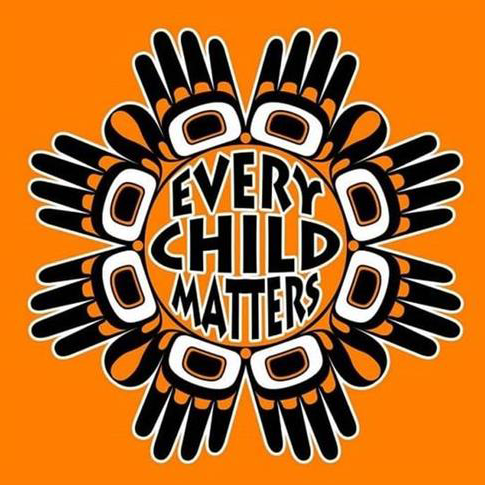Earlier this year the federal government legislated September 30 as National Day for Truth and Reconciliation. This is a day to commemorate the tragic legacy of residential schools, which more than 150,000 First Nations, Métis, and Inuit children were forced to attend between the 1870s to 1990s.
The date notably coincides with Orange Shirt Day, an event that has been recognized annually since September 30, 2013, inspired by Phyllis Webstad’s story: on her first day at residential school the new orange shirt she was wearing was taken away from her and never returned.
Since then, orange shirts worn on the last day of September have come to symbolize the stripping away of culture, self-esteem and freedom caused by the residential school system and experienced by Indigenous communities over generations.
As unmarked graves continue to be discovered at former residential schools, we’re reminded that this is a dark chapter in Canadian history that cannot be closed. The impacts of disrupted attachments and the erasure of culture have long-lasting consequences for Indigenous families and communities that need to be confronted.
What can we do?
In 2015, Truth and Reconciliation Commission of Canada (TRC) published ‘94 Calls to Action’ urging all levels of government, varying institutions and Canadians to work together to repair the harm brought on by residential schools and move forward with reconciliation.
National Day for Truth and Reconciliation was established in direct response to TRC’s Call to Action 80:
We call upon the federal government, in collaboration with Aboriginal peoples, to establish, as a statutory holiday, a National Day for Truth and Reconciliation to honour Survivors, their families, and communities, and ensure that public commemoration of the history and legacy of residential schools remains a vital component of the reconciliation process.
While TRC’s Call to Action 92, Business and Reconciliation, call out businesses and organizations. Call to Action 92 affirms that Canada’s corporate sector does has a role to play in improving relationships between Indigenous and non-Indigenous communities.
More specifically, by committing to:
- Meaningful consultations and consent before developing economic projects
- Ensuring equitable access to jobs and training for Aboriginal peoples
- Educating leaders and staff on Aboriginal history including the residential school system
What does Call to Action 92 mean for HR professionals and organizations today?
Canadian Council for Aboriginal Business (CCAB) developed the Business in Reconciliation in Canada Guidebook, a free resource to show how organizations can apply Call to Action 92 practically to their businesses.
Here are four core pillars you and your organization can adopt to advance successful Indigenous relations in the workplace:
- Inclusive leadership, which can look like:
- Ongoing cultural awareness for staff (check out Reconciliation Learning Experiences for Organizations or KAIROS Blanket Exercise)
- Participating in a third-party assessment to confirm corporate policies and standards align with the 92nd Call to Action such as the Progressive Aboriginal Relations program
- Incorporating Indigenous-focused initiatives in your CSR strategy
- Dedication to Indigenous development, which can look like:
- Partnering with Indigenous-led organizations on development projects
- Attending networking events
- Transparent and accessible procurement initiatives, which can look like:
- Using Indigenous sourced products in your store, office or workspace
- Promoting and supporting Indigenous businesses to staff and stakeholders
- Strengthening community relationships, which can look like:
- Hiring Indigenous staff and creating an Indigenous support group
- Employing Indigenous consultants especially when a project will impact an Indigenous community
- Offering on the job training, mentorships or internships to support Indigenous workers and to ensure they can succeed for years to come
Click here to access the Business in Reconciliation in Canada Guidebook for more information.
How is HRPA Acknowledging This Day?
The HRPA has elected to voluntarily recognize this important day as a statutory holiday and, as such, employees will not be reporting to work. We will return to the office on Friday, October 1, 2021.
HRPA members, stakeholders and employees are encouraged to honour National Day for Truth and Reconciliation and survivors through personal reflection and meaningful discussion about the effects of residential schools; education through the resources shared on this page; and participation in events like Orange Shirt Day (in which HRPA staff were provided with orange shirts). We encourage you to join us.
There is no quick or easy fix to redress the legacy of residential schools. Racist systems and acts of oppression against Indigenous peoples were built over several generations. They will only be dismantled and re-built through an ongoing commitment to progressing reconciliation in society and the workforce.
Resources:
- Former Residential School students can call 1-866-925-4419 for information on mental health supports from the Government of Canada
- Indigenous peoples can access The Hope for Wellness Help Line
- Orange Shirt Society
- History of Residential Schools
- Calls to Action – Truth and Reconciliation Commission of Canada
- Indian Residential School Survivors Society
- Residential Schools – It’s Our Time Toolkit
- Business in Reconciliation in Canada Guidebook
- National Centre for Truth and Reconciliation
Things to do:
- Learn the history of the land you live on or the closest residential schools to you
- KAIROS Blanket Exercise
- Donate – here is a list of Indigenous charities
- Reconciliation Learning Experiences for Organizations
- Join Circles for Reconciliation
- Watch Alanis Obomsawin – Documentary Films
- Read I Am Not a Number by Jenny Kay Dupuis and Kathy Kacer
- Browse HRPA’s e-learning on Demand for courses on inclusion and dismantling unconscious bias in the workplace
